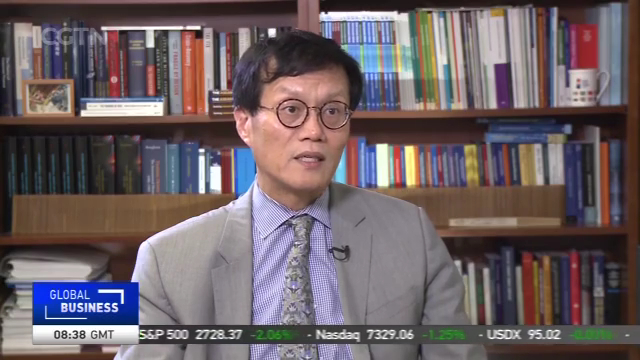
17:14, 12-Oct-2018
Economic Outlook: Changyong Rhee: any restriction on trade will impact negatively
Updated
16:33, 15-Oct-2018
02:56

For more on IMF meeting in Bali, CGTN interviewed the director of Asia and Pacific Department of the IMF --Changyong Rhee for his takeaways on the Asian economic outlook. Rhee called for multilateral cooperations to solve trade frictions.
CHANGYONG RHEE, DIR. ASIA & PACIFIC DEPT., IMF "First of all, Any restriction on global trade is a bad thing. Trade is a very important growth engine. We hope that countries will find reasonable solution through multilateralism and avoid protectionism. Having said that, it is still unfortunate now that the tension between U.S. and China is escalating. If you have many spillover effects to many other countries and regions, especially Asia, where trade is very important source of growth. Many Asian economies have close ties with U.S. and China."
CAO QINGYUN CGTN "As you mentioned, Asian economies are highly dependant on trade. How worried should we be about the impact of trade dispute to the Asian economy?"
CHANGYONG RHEE, DIR. ASIA & PACIFIC DEPT., IMF "To quantify the impact of this trade tension is not that easy. Our report tries to capture the impact through three channel including pure trade channel, sentiment of investment and financial market. So our model shows the current package of tariffs can reduce in two years Asia's economy by 0.9 percent. In case of China, it can reduce China's growth rate by 0.7 percent. But at the same time, China and other Asian economies have room to offset some of its negative impact by stimulus policies. So we assume China will use stimulus policies to offset the impact by 0.5 pecent of GDP, as a result, even the trade impact itself has a 0.7 percent of impact, then the net impact of this tension will be 0.2 percent."
CAO QINGYUN CGTN "The monetary environment has been tightening. What are the challenges that Asian economies face?"
CHANGYONG RHEE, DIR. ASIA & PACIFIC DEPT., IMF "If you look at February this year, the emerging market's turbulence in Argentina and Turkey is impacting all other emerging economies including Asia. Several Asian economies are facing pressure in exchange rate, growth and inflation. I think Asia right now is much better prepared and the current situation is much better than previous period and also compared with other emerging markets. But still, risk is risk. We think that this trade tension and the global financial tightening cycle may not end very soon."

SITEMAP
Copyright © 2018 CGTN. Beijing ICP prepared NO.16065310-3
Copyright © 2018 CGTN. Beijing ICP prepared NO.16065310-3